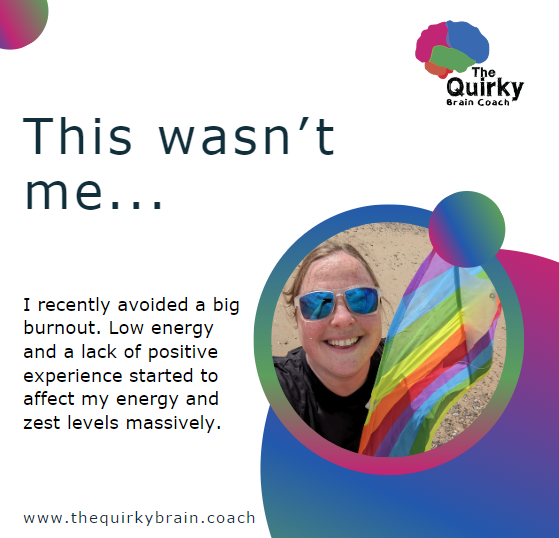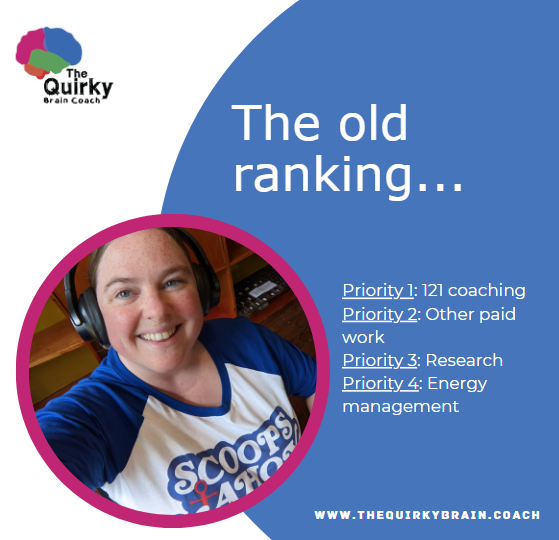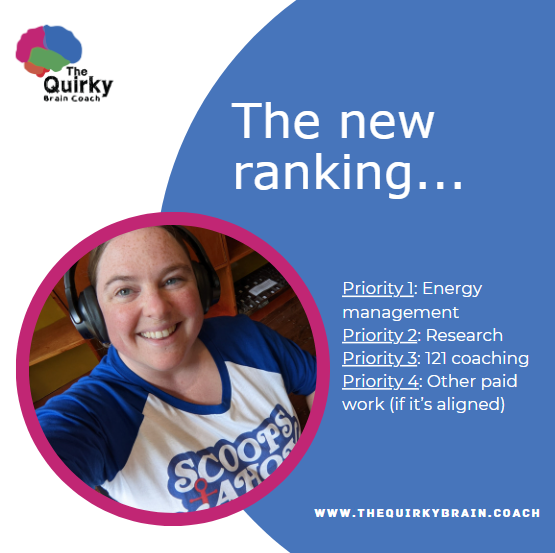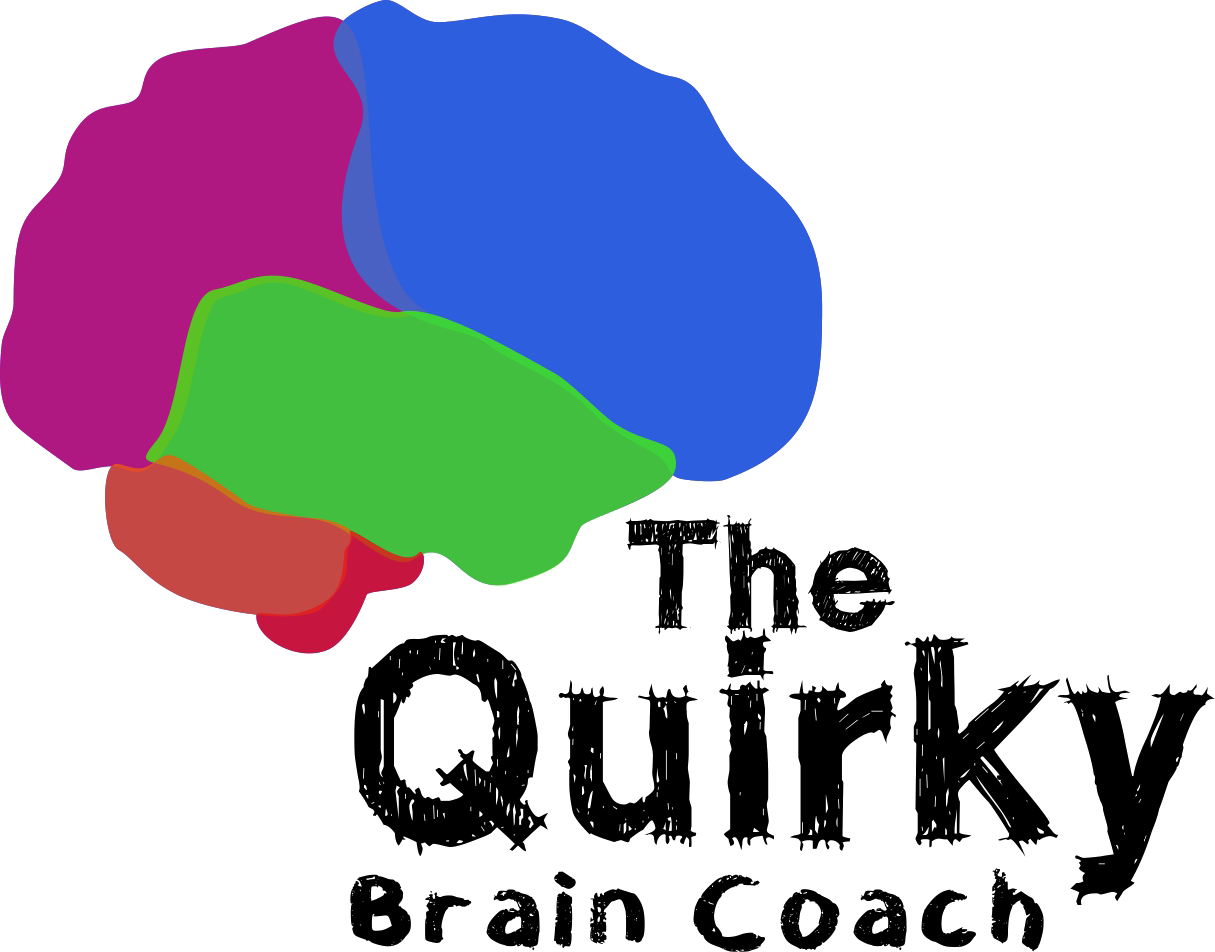
What’s your number 1 priority? Is it energy management?
What happened to me: a near miss with burnout
Recently, I almost burned out.
I was taking on too much work and saying yes to too many things. Due to the changes with the lights and the clocks, my sleep schedule was messed up and I was only sleeping 5 hours a night.
While I wouldn’t say I was depressed, I would say that I was starting to notice an absence of depth and frequency of beautiful and enjoyable emotions such as awe, joy or flow.
I was using what energy I did have to focus on work and ensure I could show up for my coachees and learners in a professional, safe and supportive way.
One day, I woke up and realised I was having a diverticulitis flare – my guts were inflamed. One of the things I often say to my clients is this: if you don’t actively decide to take a recovery break, your brain or your body will decide to take one for you. And this is what happened to me – I wasn’t taking heed of feeling low on energy, and my body decided to force a pause.
As I felt so poorly and low on energy, I decided I should listen and take a proper pause. I rescheduled non-essential appointments and meetings for a week. I spent some time taking baths and walking. I also allowed myself to just sit on the sofa, wearing soft clothes and cuddling my dog, and watching YouTube videos about topics that interested me.
It helped.
And then I went “back to work” and, within a few days, I started to feel tired again.
Why? I had taken a break and temporarily staved off the burnout BUT there was one thing I did not do…
Review the near miss with burnout and understand the factors that led up to it, and then make changes to my routines and practices to reduce the chance of burnout happening again in the near future.
I had forgotten another one of my own lessons that I share with people: If nothing changes, nothing changes. In other words, I had not grasped that if I went right back to doing what I was doing in the lead up to potential burnout, I ran the risk of burning out spectacularly, and very soon.
As I often do, I thought to myself: what would I encourage a client to think about IF I were helping them with this area of their life?
I realised I’d probably be asking questions about and running coaching exercises on priorities, and where that person wants to put their time, energy, and brain bandwidth. I decided to reflect on my priorities and journal on how these could help me with energy management.
What I learned from Robbie Williams (yes, I know!)
The other day, I ended up watching the Netflix documentary on Robbie Williams.
In it, he reviews his life and discusses and comes to terms with things that happened to him during his time in Take That, and as a solo artist.
I was never into Take That (I don’t think my demand avoidance let me) but there was something I liked about Robbie. I even bought and listened to some of his early solo music.
When I journal, I like to listen to music that makes me feel alive and energised – and so I played some tracks like Rock DJ and Let Me Entertain you to get my brain juices flowing.
Out of curiosity (one of my signature strengths), I decided to see what Robbie had released recently, figuring he’d surely having music to promote if he had a documentary out.
I was gobsmacked to find that Robbie Williams had started an Electronic Dance Music Project called Lufthaus, and had released an album of great dance music this year. Thinking about what he’d said in the documentary about not being himself or not making the music he had wanted to make at times, it struck me that, perhaps, Robbie had got to a place where he could be more authentic and explore the musical projects that felt like a priority to him.
I decided that maybe I need to take a leaf from Robbie’s book, and think about what my purpose was and what my priorities are now, so I can focus on bringing them to life.
I realised that my purpose in life is to help others learn how to coach effectively, and, in particular, to coach neurodivergent people effectively.
I realised that I wasn’t fully bringing this to life because all of my priorities were in the wrong order. And not only was this causing me to head towards burnout at times, but the ordering of my priorities meant I could not step fully into my purpose of helping others learn to coach.
Here’s the old order of priorities…

This was the list of priorities that I was using to decide where to put my time and energy.
No wonder I was getting burned out.
I was putting my work first, was never getting around to my research because I was so busy with work, and was getting burned out quickly because looking after my energy levels came last of all on my list of priorities.
Working with a friend, I re-ordered my priorities
Here’s my new ranking of priorities, based on a coaching and journalling conversation that my best friend ran with me:

I realised that time, money, work etc ARE important BUT the one resource I really need to worry about is energy.
If I haven’t got enough energy, I can’t work, and I won’t be able to do research that helps me fulfil my purpose of helping other people to learn to coach well.
I understood that I needed to create a schedule for myself (flexible and adjustable, of course) that would allow me to manage my energy and concentrate on my wellbeing as a first priority. I understood that, if I didn’t, I would find myself approaching burnout again rapidly.
What I did with my schedule
I drew out a week in my journal with a ruler and pencil.
I put in Wednesdays and Sundays as “true days off”. As I have ADHD, I can spend free time on researching things that are highly interesting to me and, while that feels good, it can take energy from me and prevent me from resting my body.
So on true days off, I have committed to not doing things that use up my brainpower. I might have a bath, allow myself to watch TV as much as I want, or take a hike with my dog – or just lie on the floor and breathe. Whatever I need to rest and recharge.
As I have decided research is actually a really high priority for me, I have now chosen two mornings a week where I work on my research project. For the first time in my life, I am protecting time and space for research BEFORE I make time and space in the schedule for any paid work.
Only once the rest and research went into the weekly plan did I put in the mornings where I work with my coaching clients, and the afternoons where I can do other paid work if I want or need to.
Once I could see the new weekly plan, I could see that not all my time is full, and that there is also choice and flexibility there if I need it. This helped me to feel the benefits of having a structure, but allowed me to feel like I have influence and choice over my schedule – I can delete or reduce things or add things in if I have the need.
This sense of choice, autonomy and having influence is vital for me, as I can experience demand avoidance when I am stressed or tired. Having that sense means I am more likely to choose to follow the schedule for the most-part, and live a life in line with my re-ordered priorities.
Notice that energy management is at the top
In the title of this piece, I asked you what your number one priority was…and I asked you whether or not it’s energy management.
Notice that while I have desires around the research and work I prioritise, I have put energy management as my top priority.
Now, energy management genuinely might not be a top priority for you. You may be doing well with that or do it quite instinctively, and so it is not something you need to put first right now. If that is the case, that’s absolutely fine – your priorities are yours, and mine are mine.
But what I would invite you to reflect on is this: if you are tired, if you are feeling burned out, and if – despite all your efforts – you are not currently able to give the time and energy you would like to your other priorities, could it be that energy management needs to move up your list of priorities?
If you do need to make more time, space and brain-bandwidth for energy management in your life, then this blog post may have given you some tips on how you might reflect on your priorities, and think about where you spend your resources to promote things like energy management.
External support for working out your priorities
If you feel like you’d like to connect with your priorities, put them in a helpful order, and turn that information into a workable way of being, then you can get help with this if the processes I went through do not come to you naturally.
Many neurodivergent people are verbal thinkers or external thinkers. If you are such a person, it may mean that you need to think or write in order to make sense of your needs and how you intend to meet them.
A journal is a great low-cost and personalisable way of noticing where you are at and what you need. Through journalling, your awareness of your needs and the benefits of meeting them naturally increase, and, therefore, motivation to make small changes to support yourself often naturally increases as well.
Peer support groups (online or face-to-face) can be great spaces for speaking through what you want and how to get there. Such groups are often free of charge and run by skilled facilitators who will ask you the right questions to pull out what you could do with thinking about. Simply look on social media platforms for what is available in your area.
You can also work with a therapist, or a coach like me. Whatever and whoever you choose, I always recommend working with professionals who have both lived experience and professional experience of helping a range of brains identify their needs and come up with workable, self-chosen ways to meet those needs.
When someone starts coaching with me, one of the things I usually do is a life review of who you are, where you are at, and what you want and need to help you get to where you want to go through the coaching. With many clients, it emerges that our first thing to do is look at energy management, life rhythms, working patterns, and making space for you to just be you and do your own thing at times. I have specific coaching and follow-up activities to help you with stuff like this.
If you’d like a consult to see how I could help you with your priorities and/or energy management in pursuit of your priorities, ask for a consult here.
If you have an urgent need, you can pay for coaching privately to access effective help quicker. If you’re in the UK and can wait several months for assessment, and you are in some kind of work, Access to Work can pay for your coaching. Apply here.
Finally, I send out a newsletter each week which often contains free reflection and self-coaching exercises on themes like energy management. If you haven’t signed up, you could here to receive ideas for something like journalling in your own time.
I wish you all the best for making sense of your priorities and thinking about what to put in place for you to make those priorities come to life.
Becci

